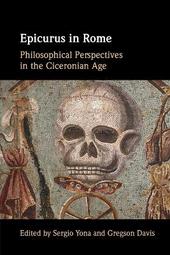
|
Epicurus in Rome: Philosophical Perspectives in the Ciceronian Age
Paperback / softback
Main Details
| Title |
Epicurus in Rome: Philosophical Perspectives in the Ciceronian Age
|
| Authors and Contributors |
Edited by Sergio Yona
|
|
Edited by Gregson Davis
|
| Physical Properties |
| Format:Paperback / softback | | Pages:220 |
|
| Category/Genre | Western philosophy - Ancient to c 500 |
|---|
| ISBN/Barcode |
9781009281393
|
| Classifications | Dewey:187 |
|---|
| Audience | |
|---|
| Edition |
Revised edition
|
| Illustrations |
Worked examples or Exercises
|
|
Publishing Details |
| Publisher |
Cambridge University Press
|
| Imprint |
Cambridge University Press
|
| Publication Date |
9 February 2023 |
| Publication Country |
United Kingdom
|
Description
The role of Greek thought in the final days of the Roman republic is a topic that has garnered much attention in recent years. This volume of essays, commissioned specially from a distinguished international group of scholars, explores the role and influence of Greek philosophy, specifically Epicureanism, in the late republic. It focuses primarily (although not exclusively) on the works and views of Cicero, premier politician and Roman philosopher of the day, and Lucretius, foremost among the representatives and supporters of Epicureanism at the time. Throughout the volume, the impact of such disparate reception on the part of these leading authors is explored in a way that illuminates the popularity as well as the controversy attached to the followers of Epicurus in Italy, ranging from ethical and political concerns to the understanding of scientific and celestial phenomena. This title is also available as Open Access on Cambridge Core.
Author Biography
Sergio Yona is an Assistant Professor in the Department of Ancient Mediterranean Studies at the University of Missouri. He is the author of Epicurean Ethics in Horace: The Psychology of Satire (2018). Gregson Davis is Andrew W. Mellon Professor Emeritus at Duke University. His major publications include: Polyhymnia: The Rhetoric of Horatian Lyric Discourse (1984) and Parthenope: The Interplay of Ideas in Vergilian Bucolic (2012).
|